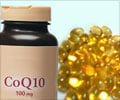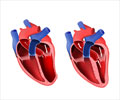Long term use of a left ventricular assist device (LVAD) by patients with heart failure may induce regeneration of heart muscle by preventing oxidative damage to a cell-regulator mechanism.

Researchers looked at pre- and post-LVAD samples of heart muscle in 10 patients with heart failure. They examined the paired tissue samples for markers of DNA damage and cell proliferation. Senior author of the study, Dr. Hesham Sadek, said, "We looked at markers of what is called the DNA damage response in cardiomyocytes (heart-muscle cells) of these patients. The response is composed of a cascade of proteins that is activated in response to DNA damage and in turn shuts off the ability of cardiomyocytes to divide. We found that patients who were on LVAD for more than six months had significantly decreased levels of DNA damage response."
When investigators examined the paired tissue samples for markers of cell division, they found that patients who were on LVADs for six months or longer had a significant increase in cardiomyocyte proliferation. The increase in cell proliferation almost tripled. Dr. Sadek said, "This result shows that patients with mechanical assist devices have the ability to make their muscle cells divide. And the obvious question now is, are these hearts regenerating? Could LVADs be used as a cure for heart failure?"
The findings raise the prospect of reawakening otherwise quiescent cardiac muscle cells, coaxing them into regenerating new and healthy cells. This study will be an important first step toward uncovering methods of promoting myocardial recovery.
This paper is published online in the Journal of the American College of Cardiology.
Source-Medindia













